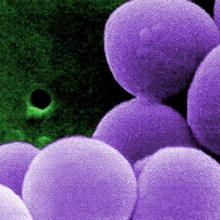The growing numbers of resistant bacterial pathogenic agents and with this the increasing limitation of available active antibiotics poses one of the greatest challenges of the global health system. The research group “antibioPPAP”, funded for three years by the Ministry for Science and Culture from the State of Baden-Württemberg under the leadership of Professor Bernd Plietker (Institute of Organic Chemistry, University of Stuttgart) and Professor Friedrich Götz (Interfaculty Institute for Microbiology and Infection Medicine, University of Tübingen), are now intensifying the further development of new types of MRSA and VRE-active antibiotics after joint preliminary work.
According to current evaluations by the World Health Organization WHO, multi-resistant germs represent one of the most dangerous global health risks. Multi-resistance has many causes. As a starting point what holds true is the improper or excessive use of antibiotics, among other things also in animal husbandry. Other factors, such as suboptimal hygiene, promote the spread of germs. This is highly problematic, particularly in the environment of hospitals. The workgroups led by Professor Friedrich Götz (University of Tübingen) and Professor Bernd Plietker (University of Stuttgart) recently presented non-natural polycyclic polyprenylated acyl phloroglucinols (PPAP) as a new category of highly potent antibiotically active substances against multi-resistant germs1). These active ingredients based on natural precursors were able to be produced fully synthetically in a few steps2) and exhibit a very high activity against gram-positive vancomycin-resistant enterococcus (VRE) and methicillin-resistant staphylococcus aureous strains (MRSA).
In order to now develop these results further in an application-oriented way a new research consortium was founded in which six groups from the Universities of Stuttgart (Faculty of Chemistry), Tübingen (Faculty of Biology) and Ulm (University Clinic Ulm) cooperate. It is a matter of the further development of the PPAPs in the direction of an increase in activity as well as in the direction of clarification among others things of site of action and effect mechanisms, bioavailability, biostability or toxicity. The research group funded by the Ministry for Science and Culture from the State of Baden-Württemberg has the aim of laying the foundation stone for a national and international network in the field of PPAP-based antibiotics within the three-year funding period. The latest findings indicate a to date unprecedented effect mechanism in which PPAPs attack and demetallate particularly ferrous proteins within the bacterial cell.
1) Reference publication:
Polycyclic, polyprenylated acylphloroglucinols – a new category non-peptide based MRSA and VRE-active antibiotics, by Claudia Guttroff, Aslihan Baykal, Huanhuan Wang, Peter Popella, Frank Kraus, Nicole Biber, Sophia Krauss, Friedrich Götz and Bernd Plietker, Applied Chemistry 129, 2017, DOI:10.1002/ange.201707069
http://onlinelibrary.wiley.com/doi/10.1002/ange.201707069/abstract;jsessionid=03D95ADC34938106E946F59093166B20.f02t03
2)Reference publication:
The total synthesis of hyperpapuanone, hyperibone L, epi-clusianone and oblongifolin A, by Nicole Biber, Katrin Möws and Bernd Plietker, Nature Chemistry, 3, 2011, 938, DOI: 10.1038/nchem.1170
https://www.nature.com/articles/nchem.1170
Expert Contact:
Professor Bernd Plietker, University of Stuttgart, Institute of Organic Chemistry, Tel. +49-(0)711-685 64283, Mail
Prof. Friedrich Götz, Eberhard Karls-Universität Tübingen, Interfakultäres Institute of Microbiology and Infection Medicine, Tel. +49-(0)7071-297 4128, Mail


